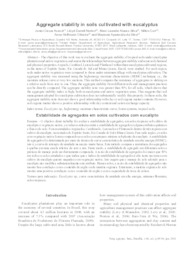Aggregate stability in soils cultivated with eucalyptus.
Aggregate stability in soils cultivated with eucalyptus.
Author(s): AVANZI, J. C.; NORTON, L. D.; SILVA, M. L. N.; CURI, N.; OLIVEIRA, A. H.; SILVA, M. A. da
Summary: The objective of this work was to evaluate the aggregate stability of tropical soils under eucalyptus plantation and native vegetation, and assess the relationships between aggregate stability and some soil chemical and physical properties. Argisols, Cambisol, Latosols and Plinthosol within three eucalyptus-cultivated regions, in the states of Espírito Santo, Rio Grande do Sul and Minas Gerais, Brazil, were studied. For each region, soils under native vegetation were compared to those under minimum tillage with eucalyptus cultivation. The aggregate stability was measured using the high‑energy moisture characteristic (HEMC) technique, i.e., the moisture release curve at very low suctions. This method compares the resistance of aggregates to slaking on a relative scale from zero to one. Thus, the aggregate stability from different soils and management practices can be directly compared. The aggregate stability ratio was greater than 50% for all soils, which shows that the aggregate stability index is high, both in eucalyptus and native vegetation areas. This suggests that soil management adopted for eucalyptus cultivation does not substantially modify this property. In these soils, the aggregate stability ratio does not show a good relationship with clay or soil organic matter contents. However, soil organic matter shows a positive relationship with clay content and cation exchange capacity.
Publication year: 2011
Types of publication: Journal article
Observation
Some of Embrapa's publications are published as ePub files. To read them, use or download one of the following free software options to your computer or mobile device. Android: Google Play Books; IOS: iBooks; Windows and Linux: Calibre.
Access other publications
Access the Agricultural Research Database (BDPA) to consult Embrapa's full library collection and records.
Visit Embrapa Bookstore to purchase books and other publications sold by Embrapa.

